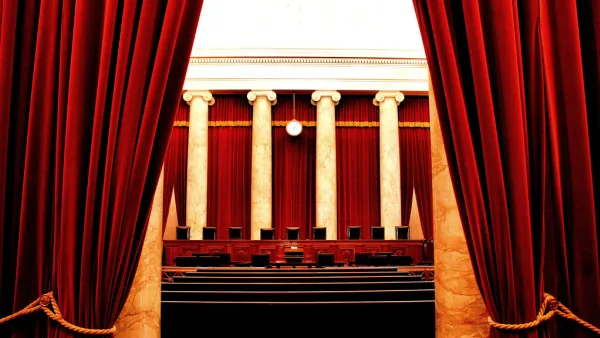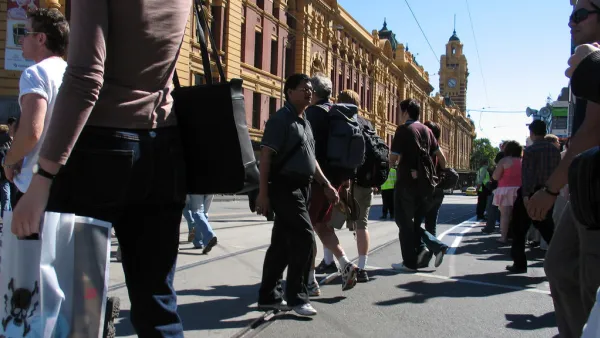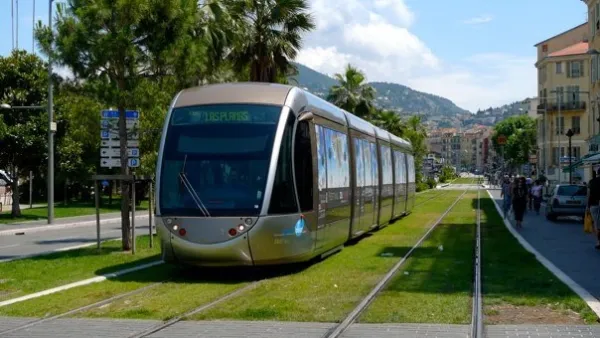Land Use
Does New Orleans Need a New Tourism Icon?
The centerpiece of a $500 million plan for redeveloping New Orleans' riverfront is an 'iconic' sculpture, replacing the empty World Trade Center tower. Roberta Brandes Gratz argues the city should focus on small steps instead of a tourism boondoggle.
St. Louis Reneges on Plan to Study Highway Teardown
With great fanfare, St. Louis put out an RFP last year to study the conversion of a portion of the elevated I-70 highway separating downtown St. Louis from its historic riverfront into a boulevard. That study has been scrapped for vague reasons.

U.S. Supremes Tighten the Screws on Exactions
The Supreme Court's ruling Tuesday in the Koontz case could have a chilling effect on all negotiations between government agencies and developers, says Bill Fulton. Are Alito and Kagan on the same planet?
What Makes Berlin’s Cultural Clusters Sing?
Last week, PlaceMaker Hazel Borys explored the comfortable charms of London. This week her whirlwind travelog continue with this study of Berlin's cultural clusters. Get your public space on!

Don't Count on a Millennial to Buy Your Suburban Home
James Briggs speaks for his Millennial generation cohorts when he outlines the many reasons why unloading that suburban home on young buyers will be a hard sell.
Divergent Views on the State of America's Cities; Can They Both Be Right?
Kaid Benfield discusses two influential new publications that posit very different takes on the state of America's cities. While he finds elements to agree with in both, Benfield ultimately finds himself an optimist when it comes to our urban future.

How Jan Gehl Turned Melbourne into a Pedestrian Paradise
Danish architect Jan Gehl and a steadfast group of local collaborators have transformed Melbourne from a lifeless 9-5 city into a preeminently livable place. Mitra Anderson-Oliver looks at the principles that have guided their work.
Eat the City: The Art of Urban Farming
Architectural historian Richard Ingersoll surveys creative 'civic agriculture' projects in the United States and Europe where abandoned lots have been transformed into edible landscapes.
Can America Adapt Its Waterfronts Before They Drown?
America's voracious appetite for waterfront development continues, even as a future filled with rising seas and extreme storms becomes more evident. The most proactive coastal areas have begun planing for adaptation, but are they doing enough?
Responding to Smart Growth Criticism
Critics claim that smart growth policies are ineffective at reducing vehicle travel and achieving intended to objectives. This column critiques their arguments.

The ‘Driving Boom’ is Over: What Does That Mean for Communities and Transportation?
The trend toward less driving received national attention in May with the release of a report by US Public Interest Research Group (PIRG), and the news has profound implications for both urbanism and transportation.

Three Everyday Ways to Inspire Urban Change
Chuck Wolfe suggests three, perhaps non-traditional ideas for how to inspire acceptance of change in our cities through accessible experiences.
Temporary Camps Become Permanent Cities for Refugees
Published to coincide with World Refugee Day, Smithsonian has assembled an interactive map of the 50 largest refugee camps in the world. Many of the camps, which together house 1.9 million people, are comparable in size to medium-sized U.S. cities.
The Ideal City is....an Equation?
What is the apt metaphor for a city? Machines? Insect colonies? In a new paper, physicist Luis Bettencourt says that if we look to the function of cities we find that they're essentially social reactors that obey universal mathematical parameters.
Examining Europe's Attraction to Historical Pastiche
Lost amid the protests and heavy-handed police response throughout Turkey is the original debate over the proposed reconstruction of an historic military barracks in Gezi Park. Feargus O’Sullivan says such debates are playing out across Europe.
Hollywood's Twin Towers Get a Haircut, But Will State Objections Block Final Approval?
Two towers set to transform Hollywood's skyline will alter it just a bit less after developer Millennium agreed to lower their proposed heights by more than a dozen stories. The CA Department of Transportation is raising concerns about the project.

Land in Conflict: How Planners Can Better Manage an Increasingly Contentious Public Process
Land use disputes are increasingly taking up our time and producing unsatisfying results. A new approach to resolving conflict based on mutual gains may provide a better way to manage the most challenging situations.
Bloomingdale Trail Gets New Name and Final Plan
Final plans for what will become the longest elevated park in the world where unveiled this week in Chicago. The 2.7-mile rail-to-trail conversion has been branded as The 606, a nod to the zip code digits shared by the neighborhoods along its route.
Architect Ego Trip or Necessity for a Modern Metropolis? Paris Debates Skyscrapers
Following Mayor Bertrand Delanoe's overturn of a ban on buildings over seven storeys high, Paris is planning a dozen new skyscrapers outside the city centre. Debate over the towers is destined to become an issue in next year's municipal elections.
Should Cities Eliminate Free Parking for the Disabled?
Ongoing research from the University of California Transportation Center documents the detrimental effects that free street parking for the disabled has on city coffers and performance pricing systems. Is it time to reconsider such laws.
Pagination
Urban Design for Planners 1: Software Tools
This six-course series explores essential urban design concepts using open source software and equips planners with the tools they need to participate fully in the urban design process.
Planning for Universal Design
Learn the tools for implementing Universal Design in planning regulations.
EMC Planning Group, Inc.
Planetizen
Planetizen
Mpact (formerly Rail~Volution)
Great Falls Development Authority, Inc.
HUDs Office of Policy Development and Research
NYU Wagner Graduate School of Public Service


































